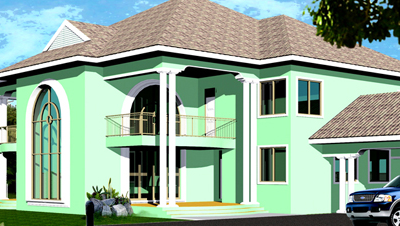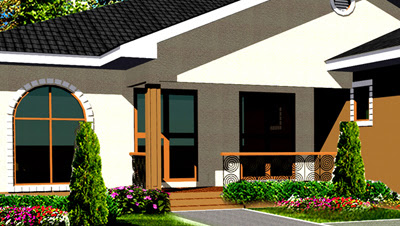Creating a floor plan that suits your own unique lifestyle is almost as exciting as watching your dream home being built. It doesn’t matter if you dream of a spacious abode in the suburbs or a more modest home in the metropolis—the process is filled with pride and prosperity. Here are seven steps to help you design your dream home.
Monday, April 29, 2013
The Chief Architect’s 7 Steps to Designing Your Dream Home in Ghana
Creating a floor plan that suits your own unique lifestyle is almost as exciting as watching your dream home being built. It doesn’t matter if you dream of a spacious abode in the suburbs or a more modest home in the metropolis—the process is filled with pride and prosperity. Here are seven steps to help you design your dream home.
Thursday, April 25, 2013
Is It a Culture Thing? Ghanaians Don't Want A Cookie Cutter House, They Want A Custom Home
The country of Ghana is one of the most ethnically and culturally diverse countries in the world. It is a mixture of Adangbe, Akan, Dagomba and Ewe people to name just a few. The cultural diversity is extremely evident in their arts, cuisine and clothing. Colorful textiles are worn for special social and important religious occasions. Culturally, clothing is more than just cloth; it is also a visual representation of history and a way of expressing one’s self. It is no surprise that Ghanaians take as much pride in the design of their homes as they do in the design of their clothing.
Culture Driven, Not Consumer Driven
Home plans in Ghana are not consumer driven as they are in other parts of the world. In America, for instance, cookie cutter home are abundant—especially in the suburbs. This is because builders enjoy economies of scale by building a large quantity of homes in very similar styles. They can purchase materials in bulk and build the same style more efficiently. The people of Ghana, however, would rather have their home reflect their heritage and culture in much the same way that their clothing does. They are not in competition with their neighbors or “trying to keep up with the Joneses.”Identity Based Investment
There are many different real estate investment opportunities in Ghana. The most welcoming and profitable opportunities are identity based investments that allow Ghanaians to participate in entire process—from the floor plan design to the final walk inspection—and really make the home a representation of who they are. Foreign investors are often surprised at how powerful identity based real estate investments can be. They become connected to the people of Ghana and find that the benefits of investing in Ghana real estate are much more than monetary.Pride Of Ownership
For many Ghanaians, owning their own home will be the biggest accomplishment of their lives. Some save for 10 to 15 years just to be able to afford their dream home that is considered quite modest by American standards. Yet, they still have a tremendous pride in ownership.To begin the process of designing your dream home that you can be proud of, browse Ghana House Plans and select the plan that closely matches your dream home and let Ghana Homes customize to fit your style.
Monday, April 22, 2013
Building A Home In Ghana? Learn How To Maximize Your Building Materials
Make Substitutions If Necessary
There are a number of factors that influence the price of building materials. They include:- Material demand
- Local availability of products
- Global economic conditions
- Design and efficiency of the house
The architects at a reputable firm such as Ghana Homes can also review your plans to determine if there are better ways to utilize the space and reduce the need for unnecessary materials.
Get A Bill Of Quantity
A bill of quantity is essentially a list of all of the raw materials, hardware and other components needed to build a home based on a specific house plan. This can help you forecast the costs of materials and budget accordingly. Ghana Homes provides this service for a nominal fee.Make A Shipping Container
If you are a foreign investor building a home in Ghana, another way that you may be able to save money on raw building materials is to purchase the supplies abroad and ship them to your trusted contractor. The bill of quantity will ensure that you have all of the necessary materials in the shipping container.Show us some love. Click on any of the social icons below to share this article!
Monday, April 15, 2013
Alarming Stats About Homes In Ghana
The real estate market in Ghana is thriving. Many people think this is because the price of land and homes is so affordable. You might be surprised to learn that this is not necessarily true. In fact, in many areas the prices are comparable to those in the United States.
Median Home Prices
It is difficult to obtain exact numbers and percentages for homes in Ghana. There is no central database or multiple listing service that tracks sales prices and charts trends. According to a 2007 report titled The Housing Market in Ghana published by the Bank of Ghana, the median home prices for new construction ranged anywhere from $17,500 US dollars for a one bedroom home to $36,000 for a 3 bedroom home.Since then, the cost of construction materials has risen dramatically. In February 2012, for instance, the cost of cement rose 13 percent in just one week; the price of door locks rose by a whopping 44 percent. The high cost of building materials has driven the price of homes in Ghana to a level that many low income families can’t afford.
In the thriving metropolis of Accra and Tema, investors are quick to snatch up any available land and build luxury properties on it. Ghana Business and Finance reports that a one or two bedroom luxury condominium sell s for around $100,000 US dollars, while a three or four bedroom or a penthouse suite can fetch up to $500,000. By comparison, the National Association of Realtors reports median home prices for the past year are $238,800 in the Northeast United States, $129,000 in the Midwest, $150,500 in the South and $237,700 in the West.
Supply and Demand
Because investors can turn a better profit on properties on upper-class properties such as condominiums in Accra, they have neglected the growing demand for affordable homes for low and middle income families. The supply is low, yet the demand continues to increase from the influx of foreign nationals, Ghanaians returning home as well as job expansions in the oil industry. Whenever the demand is greater than the supply, the price of homes increases.Investment Opportunities
The Ghana real estate industry needs investors to help finance medium scale projects for middle-income projects. Whether you are a foreign investor or a resident Ghanaian, The Ghana Homes Group can help you identify investment opportunities, choose floor plans and more.Thursday, April 4, 2013
How To Choose The Right Wall And Security System For Your Home in Ghana
Compared to many other countries, Ghana has a relatively low crime rate. INTERPOL lists the crime index for Ghana at 461.28, Japan at 1,709.88 and the United States at 4,123.97. Most of the crimes committed in Ghana are done for immediate financial gain and are crimes of opportunity. Street crimes such as pickpocketing and burglary are on the rise as are property crimes such as unlawful entry and burglary.
According to a Report from the Ghana Open Data Initiative, there were 325 cases of unlawful entry and 428 robberies reported in Accra alone during the year 2010. It is difficult to obtain accurate statistics for the country as a whole because of logistical constraints faced by the police, especially in rural areas where many crimes are going unreported. There has also been a problem with corruption on the police force.
Common Crime Prevention
Because the police force is stretched so thin, it is important to take preventative measures to protect yourself, your family and your belongings.- Build a tall wall around your home in Ghana
- Install the right doors
- Install taught lock such as deadbolt locks and dead-lock
- Reinforce your home entryway
- Keep the doors to your home locked at all times
- Install a backup generator to light up your home during power outages
- Install modern burglar proof bars inside your windows
Choosing The Right Security System
Even the most basic security system will add elements of safety and security to your home and family. There are many affordable systems to choose from that have essential features such as:- Control panel
- Keypad
- Siren
- Inside motion detector
- Door and window contacts
Whatever type of security system you choose for your home in Ghana, you will want to make sure it has a reliable backup power source for the control panel in the event of a power outage. You don’t want your safety to be compromised because of a rolling blackout.
Monday, April 1, 2013
7 Surprising Reasons To Own A Home In Ghana
1. Stable and peaceful environment.
There are no threats of terrorism, and the country has held 4 elections since in 1992 and approved a new constitution without any political unrest. In fact, while courting foreign investors in 2012 Ghana President John Mahama said, “Perhaps the best thing going for Ghana is stability and peace. It is seen as an oasis of peace in a turbulent continent.”2. Location, location, location.
The country of Ghana is located just below the equator in Western Africa, bordering the Gulf of Guinea. It is a gateway to the rest of West Africa, making it the ideal location for both domestic and international trade.3. Continued economic growth.
During 2011, Ghana’s GDP grew by 14.4 percent. Since then, growth has slowed a bit with 2013 estimates forecast a growth of 7.5 percent, but it is still growing steadily. Ghana’s economic classification was recently upgraded by World Bank from low-income to lower middle-income.4. Continued population growth.
The population of Ghana is growing at an annual rate of about 2 percent. The 2000 Population and Housing Census estimates 2.3 million new homes will be built by 2025 to keep up with the growth.5. High demand for mid-range properties.
The supply of new homes for middle income families has not kept up with the demand. Investors have primarily focused on luxury properties and ignored the high demand for affordable, mid-range properties.6. Stable real estate market.
Another factor that makes owning a home in Ghana desirable for foreign investors is the stable real estate market. Property values are increasing steadily and low-interest mortgage rates are available.7. Human connection.
Words cannot describe the feeling of connection that investors often experience when they help Ghanaians realize the dream of owning their own home. Many people are surprised to discover that the benefits of investing are more than monetary.Invest in Ghana! Begin by clicking here for more infomration on investing in Ghana
Subscribe to:
Posts (Atom)
















